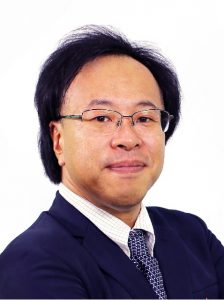COMCOM 2017 Keynotes
 Keynote 1
Keynote 1
Fuzzy Multiple Attribute Decision Routing in VANETs
Dr. Maode Ma
School of Electrical and Electronic Engineering, Nanyang Technological University, Singapore
Abstract. With the wide development of mobile Internet, Vehicular Ad Hoc Networks (VANETs) have attracted more and more research attentions. In this talk, I will address the routing issues in the VANETs from a new point of view although there are many outstanding solutions available. Considering a vehicle as a decision maker in the selecting next hop for the transmission from the candidate vehicles, we propose the Fuzzy Multiple Attribute Decision Routing (FMADR) scheme by which we characterize the candidate vehicles with multiple attributes and select the candidates for next hop transmission by the multiple attribute decision making (MADM) approach. Compared with existing routing protocols that utilize one or two specific attributes of VANETs for the next hop selection, the FMADR scheme can boost the message delivery ratio as much as possible. We have carried out simulation to evaluate the performance of the FMADR scheme with the results showing that the proposed FMADR scheme outperforms the existing well-known routing protocols for VANETs.
Biography. Dr. Maode Ma received his Ph.D. degree in computer science from Hong Kong University of Science and Tech
nology in 1999. Now, Dr. Ma is an Associate Professor in the School of Electrical and Electronic Engineering at Nanyang Technological University in Singapore. He has extensive research interests including network security and wireless networking. He has led and/or participated in over 20 research projects funded by government, industry, military and universities in various countries. Dr. Ma has more than 300 international academic publications including more than 140 journal papers and over 170 conference papers. He currently serves as the Editor-in-Chief of International Journal of Computer and Communication Engineering and International Journal of Electronic Transport. He also serves as a Senior Editor for IEEE Communications Surveys and Tutorials, and an Associate Editor for other 4 International Journals. Dr. Ma is the Fellow of IET and a senior member of IEEE Communication Society, IEEE Intelligent Transportation Systems Society, and IEEE Education Society. He is the Chair of the IEEE Education Society, Singapore Chapter. He has served as an IEEE Communication Society Distinguished Lecturer from 2013 to 2016.
 Keynote 2
Keynote 2
Artificial Neural Networks for Big Data
Professor Dr. R. Logeswaran
Professor, Faculty of Computing, Engineering and Technology, Asia Pacific University of Technology and Innovation, Technology Park Malaysia, Kuala Lumpur, Malaysia
Adjunct Professor, Multimedia University, Cyberjaya, Malaysia
Vice Chair, IEEE Signal Processing Society Malaysia Chapter
Abstract. “Big Data is the buzz word these days, with its far-reaching application across all sectors and domains. The prevalence of the data meeting the 4Vs criteria – large volume, velocity, variety and veracity, has led to the need to establish new methods and technologies to cope with the rich information available to predict and provide vital services in a timely and appropriate manner. Artificial Neural Networks (ANN) are intrinsically suitable for handling deep learning, yet very conveniently used as a “black box” to obtain the desired high performance. This talk presents some fundamentals on ANN and Big Data, and introduces some of thecurrent and future work undertaken on Big Data through the aid of ANN.”
Biography. Professor Dr. R. Logeswaran is an academic with 20 years of lecturing experience in a number of institutions both locally and abroad. He studied his B.Eng (Hons) Computing at Imperial College London, United Kingdom, and completed his Master of Engineering Science (M.Eng.Sc.) as well as Ph.D. (Engineering) at Multimedia University, Malaysia. He is a Novell Certified Linux Professional, and also a certified IC Digital Citizen and trainer. His areas of interests are mainly in multimedia data processing, data compression, neural networks, natural user interfaces and big data / data science, with over 130 publications in books, peer-reviewed journals and international conference proceedings. He enjoys supervising student projects at various levels from undergraduate to Masters and PhD, ensuring that proper research methodology and good teaching & learning practices are gained.
Prof. Loges is a full Professor with the Faculty of Computing, Engineering and technology, as well as the Chairman of the Centre for Edutainment and Educational Technologies (CEET) and a core member of the Asia Pacific Centre for Analytics (APCA) at the Asia Pacific University of Technology and Innovation (APU), where he also served as the Dean of Graduate Studies. Prior to that, he was the Dean of Engineering, Science and Technology at Nilai University and before that, the Acting Dean of Engineering and Deputy Dean of Postgraduate Studies at Multimedia University, where he is now an Adjunct Professor. A recipient of several scholarships, including Telekom Malaysia, he was recognized as the JCS 75th Anniversary Scholar for his Masters achievements and later went on to do his post-doctoral research in Seoul, Korea under the Brain Gain Malaysia international fellowship & post-doctoral programme as well as a Brain Korea21 post-doctoral scholar. A Senior Member of the Institute of Electrical and Electronics Engineers (IEEE), he is actively involved as the Vice Chair of the IEEE Signal Processing Society Malaysia chapter and is a reviewer of numerous journals and conferences. His efforts in the voluntary services over the past 19 years
as also gained him a medal for long and commendable service from the Malaysian government. Prof. Loges has been a Keynote speaker, Guest of Honour and Invited Speaker to a number of international conferences.
 Keynote 3
Keynote 3
The Power of Autoencoder: Recent Advances in Deep Learning
Prof. Kiyota Hashimoto
Prince of Songkla University, Thailand
Abstract. The third boom of the research in neural networks as we are seeing finds that deep learning can contribute much more than expected before, leading to more advanced applications of Artificial Intelligence in society. From a technical perspective, this comes from three important factors: more data availability, more computational power, and techniques against gradient loss which enables automatic feature engineering. Various autoencoders, whose primary structure is a rather simple three-layered neural network with the input layer also as the output layer and the hidden layer with fewer neurons than the input/output layer, are important key techniques that make deep learning possible, more efficient, and more effective. In this keynote, some important achievements in deep learning are sketched and a couple of recent development in autoencoders are introduced for more efficient deep learning approaches
Biography. Dr. Kiyota Hashimoto works at Faculty of Technology and Environment, Prince of Songkla University Phuket Campus, Thailand. He originally obtained his B.A. and M.A. from Kyoto University, Japan and his Doctor of Engineering from Nara Institute of Science and Technology, Japan. His expertise covers natural language processing, machine learning, text mining, Artificial Intelligence in general, as well as e-learning and higher education reforms. After 20 years of assistant, associate, and full professor at Japanese universities, he moved to Thailand, first to Asian University where he was director of Continuing Education and Research Center, and then to Prince of Songkla University in 2015. As well as more than 150 research publications, he has contributed as editor-in-chief, associate editor, etc. for international journals and various chairs for international conferences at IEEE, IEEJ, IIAI, ICIE, to name a few.